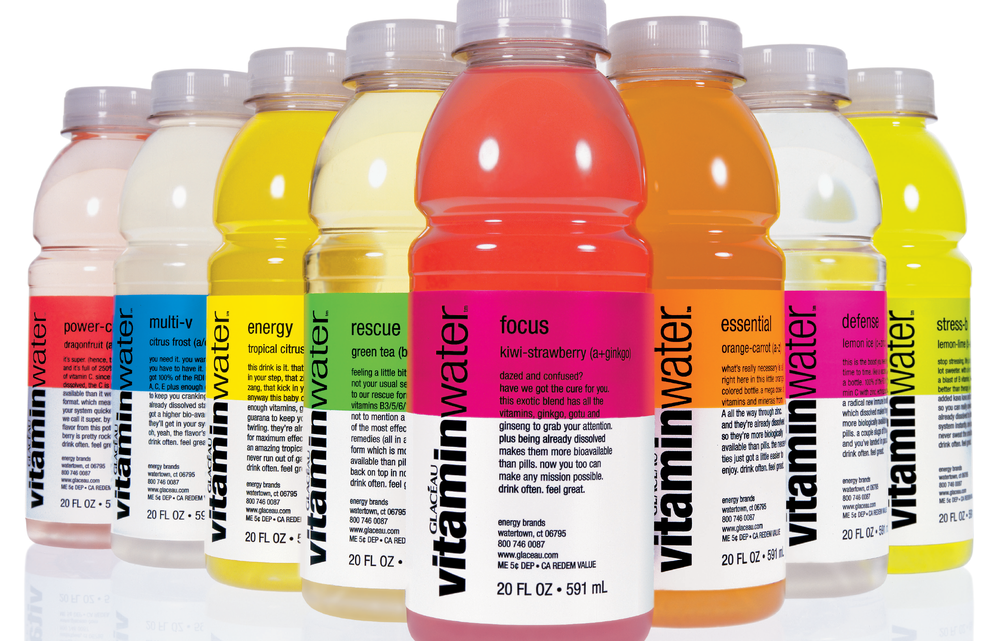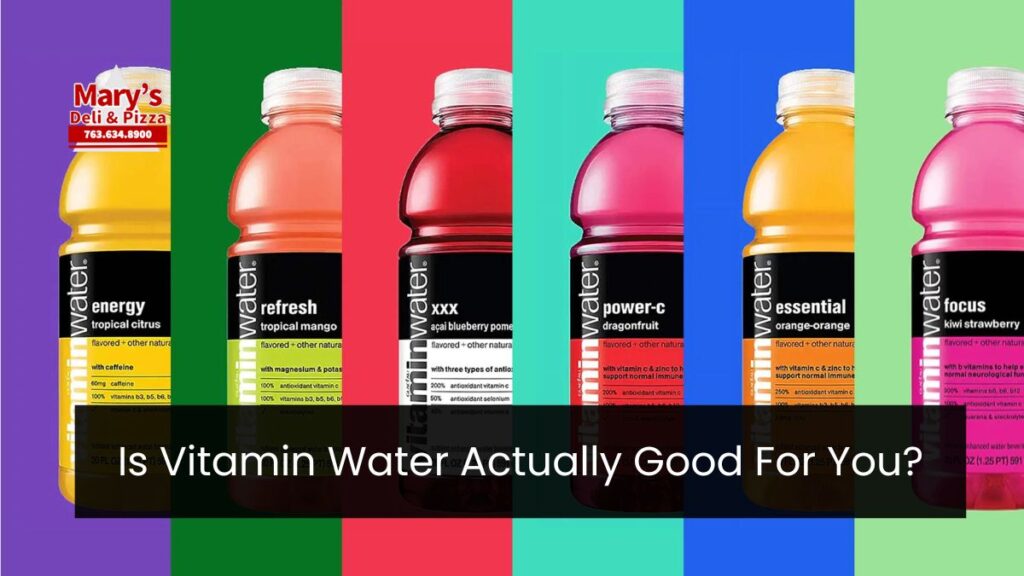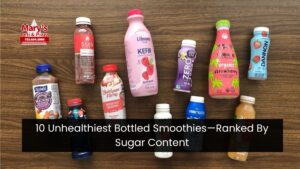Over the past two decades, Vitamin Water has grown in popularity, largely thanks to clever marketing campaigns promising health benefits.
It claims to be a blend of essential vitamins with purified water—a seemingly perfect match for anyone looking to hydrate and fuel their body. But is this sugary drink as healthy as it appears?
Let’s dig into the facts and figures to understand the true impact of drinking Vitamin Water, and whether it really is a beneficial addition to your diet.
The Appeal of Vitamin Water
Vitamin Water’s concept is simple: combine purified water with vitamins to give people a healthy, nutritious drink.
Water itself is essential for maintaining hydration, supporting organ function, and assisting with digestion, while vitamins are critical for energy production, immune support, and overall well-being. However, does combining these two elements automatically equate to a healthier beverage?
Marketing has played a significant role in the perception of Vitamin Water as a health-conscious choice, especially for individuals looking for more than just plain water.
But the truth is, when you break down the ingredients and look closely at the nutritional profile, things aren’t as simple as they seem.
What’s Really Inside Vitamin Water?

The most common question consumers ask is, “What’s in Vitamin Water?”
The primary ingredients of Vitamin Water include reverse osmosis (RO) water and added vitamins like vitamins C, B3, B5, B6, and B12.
Additionally, depending on the variety, the beverage is sweetened with either sugar or artificial sweeteners like stevia or erythritol. On the surface, this combination seems harmless, even beneficial. But let’s explore further:
1. Reverse Osmosis Water
Reverse osmosis is a filtration process that removes impurities such as pesticides, pharmaceuticals, and even arsenic from the water, ensuring that consumers get high-quality hydration.
While this aspect is beneficial, purified water alone does not mean the entire drink is good for you.
2. Vitamins
The vitamin content in Vitamin Water is appealing because it includes essential vitamins that the body needs for various functions:
- Vitamin C is a powerful antioxidant that supports immune health.
- B Vitamins (B3, B5, B6, and B12) play a role in metabolism, energy production, and brain function.
However, the reality is that consuming vitamins in excess—as in many Vitamin Water varieties—can be unnecessary and, in some cases, wasteful.
For example, a single bottle often provides 200% of your daily value for vitamin C and over 100% of certain B vitamins, which your body may not absorb fully.
3. Sugars and Sweeteners
One of the most significant concerns with Vitamin Water is its sugar content. A 20-ounce bottle of Vitamin Water contains 26-32 grams of added sugar, which is close to the recommended daily limit for added sugar consumption, according to the American Heart Association.
Regular consumption of sugary drinks, like Vitamin Water, can contribute to:
- Weight gain
- Increased risk of type 2 diabetes
- Cognitive issues
- Cardiovascular disease
If you’re thinking about the zero-sugar versions of Vitamin Water, they come with their own set of concerns.
Artificial sweeteners like stevia and erythritol can still affect metabolism and digestion, and studies suggest they may increase sugar cravings, potentially leading to overconsumption of unhealthy foods.
The Dangers of Excessive Vitamin Intake
The vitamins added to Vitamin Water can be a double-edged sword. While vitamins are essential to health, consuming too much—especially in the amounts present in many Vitamin Water products—can result in your body flushing out the excess through urine.
For instance, when you consume large doses of water-soluble vitamins like vitamin C or B vitamins, your body does not retain them efficiently. Instead, it passes them out through your urine, resulting in wasted nutrients.
Furthermore, while it’s less common, overconsumption of certain vitamins, like vitamin A or vitamin E, can lead to toxicity if ingested regularly in large amounts.
Vitamin Water typically doesn’t contain these fat-soluble vitamins, but the concept of unnecessary vitamin consumption remains the same.
Benefits of Vitamin Water: Are There Any?
While there are valid concerns about sugar and excessive vitamins, Vitamin Water does offer a few benefits:
- Hydration: Any water-based beverage helps keep the body hydrated.
- Variety of Flavors: If plain water doesn’t appeal to you, the different flavors of Vitamin Water may encourage you to drink more fluids. Popular options include flavors like acai-blueberry-pomegranate, dragon fruit, and lemonade.
- Purified Water: Thanks to the reverse osmosis process, Vitamin Water is typically made with high-quality water, free of most impurities found in tap water.
- Nutritional Boost: While the body may not absorb all the vitamins, the small amount that it does can still contribute to overall health, especially in cases where people have nutrient deficiencies.
Disadvantages of Vitamin Water
When weighing the pros and cons, it’s essential to consider the potential downsides:
- High Sugar Content: As mentioned earlier, many of the flavors have close to 30 grams of added sugar. This amount is comparable to certain soft drinks and is enough to spike insulin levels and increase the risk of various metabolic disorders.
- Artificial Sweeteners: While the zero-sugar versions avoid the issue of added sugar, artificial sweeteners like erythritol can cause gastrointestinal discomfort and may increase sugar cravings.
- Imbalanced Nutrition: Vitamin Water doesn’t contain a full spectrum of nutrients. While it may be high in vitamin C and B vitamins, it lacks other essential nutrients like magnesium, potassium, and vitamin D.
- Not Necessary for Most People: If you’re already following a balanced diet rich in fruits, vegetables, and whole foods, you’re likely meeting your daily vitamin needs without the help of Vitamin Water.
Better Alternatives To Vitamin Water
If you’re concerned about hydration and nutritional intake but want to avoid the pitfalls of Vitamin Water, consider these healthier alternatives:
- Plain Water: Nothing beats the simplicity and benefits of pure water. It hydrates without the extra sugar or unnecessary vitamins.
- Herbal Teas: Herbal teas offer a flavorful way to hydrate without added sugars or artificial sweeteners. They often come with antioxidants and other health benefits.
- Infused Water: Add fresh fruit slices, herbs, or vegetables to your water for a natural flavor boost without the added sugar.
- Coconut Water: Coconut water provides hydration along with natural electrolytes like potassium and magnesium, making it a healthier alternative to sugary drinks.
- Natural Juice (in moderation): If you enjoy a sweet beverage, opt for 100% fruit juice without added sugars. However, drink it in moderation, as even natural fruit sugars can add up quickly.
The Verdict: Is Vitamin Water Worth It?
Ultimately, Vitamin Water may not be as healthy as it seems. While it does provide a convenient source of vitamins and hydration, it also comes with a hefty dose of sugar or artificial sweeteners.
Consuming too much Vitamin Water can lead to weight gain, blood sugar spikes, and potentially even long-term health issues like diabetes and cardiovascular disease.
If you’re simply looking for hydration, water remains the best option. And if you need to increase your vitamin intake, the healthiest way to do so is through a balanced diet rich in fruits, vegetables, and whole grains.
While Vitamin Water can occasionally serve as a tasty, low-calorie alternative to sugary sodas, it should not be relied upon as a primary source of hydration or nutrition.
Conclusion:
In the end, the best beverage for your health is often the simplest: water. While Vitamin Water may seem like a good way to boost your vitamin intake, it’s crucial to remember that your body absorbs vitamins best from whole foods.
By focusing on a balanced diet and staying hydrated with plain water, you can ensure that your body gets the nutrients it needs—without the added sugar and artificial ingredients.
So, the next time you’re thirsty, choose water, herbal teas, or infused water over Vitamin Water for a healthier, more natural way to hydrate and nourish your body.






